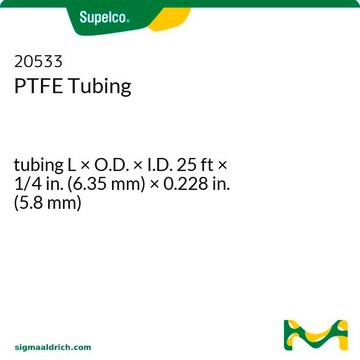06735
tert-Butyldimethylsilyl chloride
for GC derivatization, LiChropur™, ≥99.0% (GC)
Sinónimos:
tert-Butyl(chloro)dimethylsilane, tert-Butyldimethylchlorosilane, TBDMSCl
About This Item
Productos recomendados
grade
for GC derivatization
Quality Level
assay
≥99.0% (GC)
quality
LiChropur™
reaction suitability
reagent type: derivatization reagent
reaction type: Silylations
technique(s)
gas chromatography (GC): suitable
bp
125 °C (lit.)
mp
86-89 °C (lit.)
SMILES string
CC(C)(C)[Si](C)(C)Cl
InChI
1S/C6H15ClSi/c1-6(2,3)8(4,5)7/h1-5H3
InChI key
BCNZYOJHNLTNEZ-UHFFFAOYSA-N
¿Está buscando productos similares? Visita Guía de comparación de productos
related product
signalword
Danger
hcodes
Hazard Classifications
Aquatic Chronic 2 - Eye Dam. 1 - Flam. Sol. 1 - Skin Corr. 1A
Storage Class
4.1B - Flammable solid hazardous materials
wgk_germany
WGK 2
flash_point_f
71.6 °F - closed cup
flash_point_c
22 °C - closed cup
Elija entre una de las versiones más recientes:
¿Ya tiene este producto?
Encuentre la documentación para los productos que ha comprado recientemente en la Biblioteca de documentos.
Los clientes también vieron
Artículos
Results of a study involving the ability few Fluka silylating reagents to form GC-MS-compatible trimethylsilylmethyl derivatives of NSAIDs
Results of a study involving the ability few Fluka silylating reagents to form GC-MS-compatible trimethylsilylmethyl derivatives of NSAIDs
Results of a study involving the ability few Fluka silylating reagents to form GC-MS-compatible trimethylsilylmethyl derivatives of NSAIDs
Results of a study involving the ability few Fluka silylating reagents to form GC-MS-compatible trimethylsilylmethyl derivatives of NSAIDs
Nuestro equipo de científicos tiene experiencia en todas las áreas de investigación: Ciencias de la vida, Ciencia de los materiales, Síntesis química, Cromatografía, Analítica y muchas otras.
Póngase en contacto con el Servicio técnico














